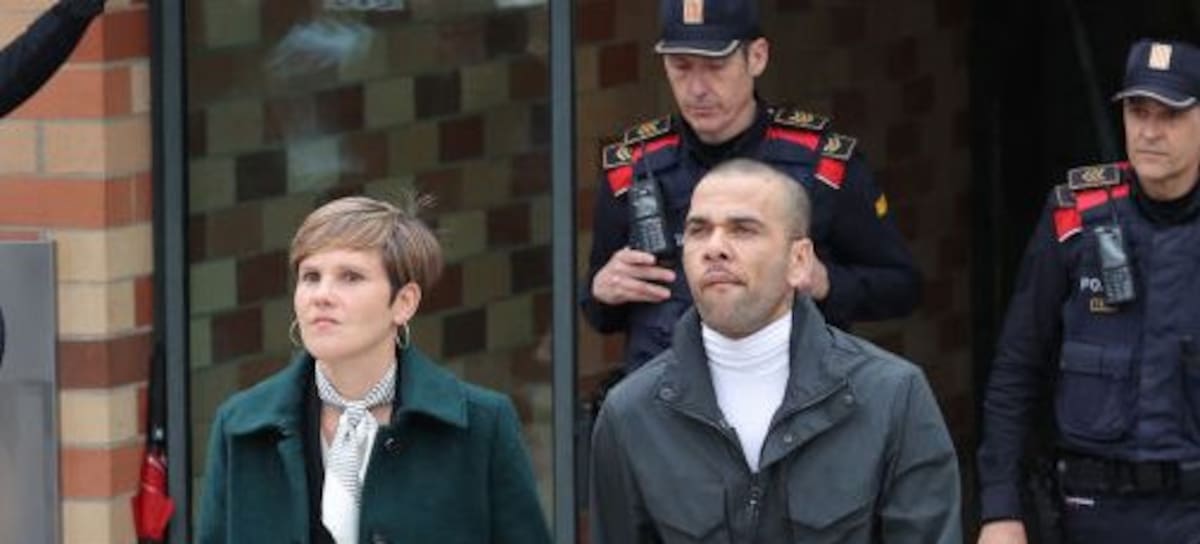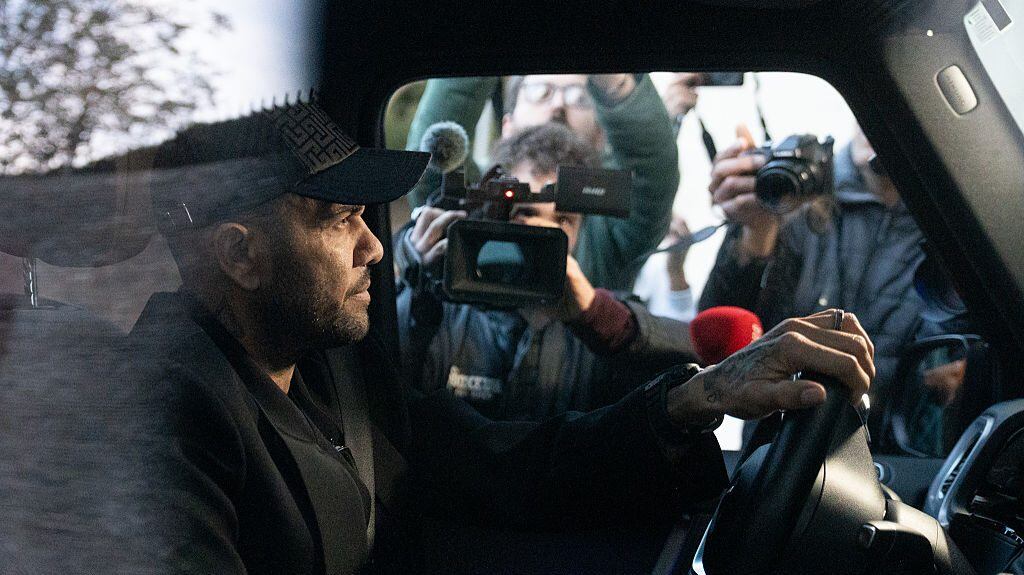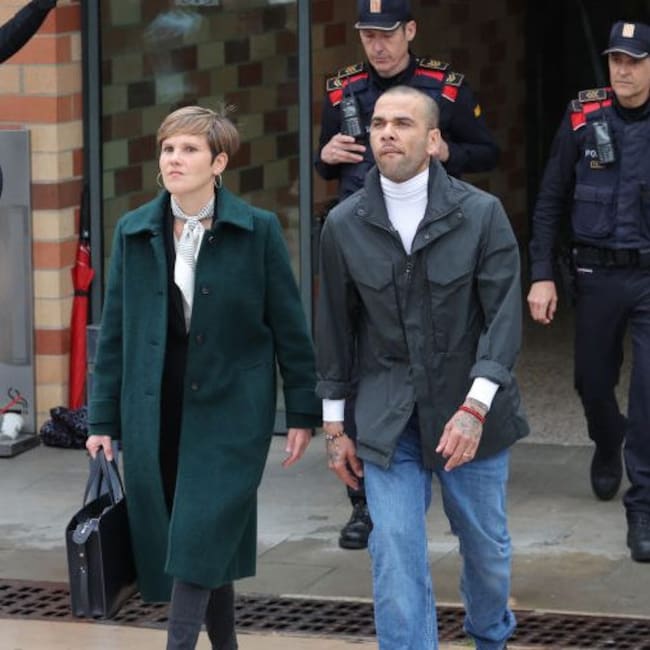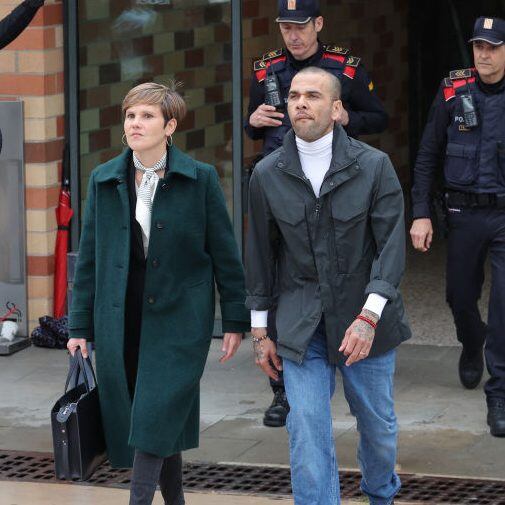Why Has Dani Alves Been Acquitted of Sexual Assault?
The former football player spent more than two months in prison in Barcelona (Spain), where the events took place

Dani Alves (R), flanked by his lawyer Ines Guardiola, leaves Brians 2 prison in San Esteban Sasroviras, near Barcelona, on March 25, 2024, after posting the one-million-euro bail set by a Barcelona court to ensure his release pending appeal. Alves was previously sentenced to 4.5 years in jail for rape on February 22, 2024. LLUIS GENE / AFP
The Superior Court of Justice of Catalonia (TSJC) (Spain) has recently acquitted former Brazilian soccer player Dani Alves of the sexual assault charge for which he had previously been sentenced to four and a half years in prison. This decision has sparked intense debate in both society and the legal field.
Reasons for Alves’ Acquittal
The acquittal is based on the TSJC’s assessment of the reliability of the complainant’s testimony. The court identified inconsistencies between the young woman’s statements and the available evidence, particularly regarding the video footage from the venue (Sutton nightclub in Barcelona) where the events took place. These discrepancies led the judges to conclude that there was insufficient evidence to overturn Alves’ presumption of innocence.

Dani Alves drives his car, on 28 March, 2025 in Esplugues de Llobregat, Barcelona, Catalonia, Spain. The Appeals Section of the Superior Court of Justice of Catalonia has unanimously overturned the sentence that sentenced former FC Barcelona player Dani Alves to 4 years and 6 months in prison for the sexual assault of a young woman at the Sutton nightclub in December 2022.

Dani Alves drives his car, on 28 March, 2025 in Esplugues de Llobregat, Barcelona, Catalonia, Spain. The Appeals Section of the Superior Court of Justice of Catalonia has unanimously overturned the sentence that sentenced former FC Barcelona player Dani Alves to 4 years and 6 months in prison for the sexual assault of a young woman at the Sutton nightclub in December 2022.
Additionally, the TSJC questioned the reliability of the complainant’s account in specific aspects, such as her behavior at the nightclub and details about the alleged sexual act. These «contradictions» were crucial in the court’s decision to overturn the initial conviction.
Reactions and Controversy
The acquittal has sparked various reactions. While some sectors support the judicial decision, others express concern about the message it may send to victims of sexual assault. Spain’s Minister of Finance, María Jesús Montero, called the ruling “shameful,” prompting judicial and prosecutorial associations to demand respect for judicial independence and urge public officials to refrain from making comments that could undermine confidence in the judicial system.
The case has also reignited the debate on the evaluation of evidence in sexual offense cases and the implementation of Spain’s Comprehensive Guarantee of Sexual Freedom Law, commonly known as the «Solo Sí Es Sí» la2 («Only Yes Means Yes» law). Some experts argue that the ruling could discourage future victims from coming forward, as they may perceive difficulties in having their testimony deemed sufficient in the absence of strong physical evidence.

Dani Alves (R), flanked by his lawyer Ines Guardiola, leaves Brians 2 prison in San Esteban Sasroviras, near Barcelona, on March 25, 2024, after posting the one-million-euro bail set by a Barcelona court to ensure his release pending appeal. Alves was previously sentenced to 4.5 years in jail for rape on February 22, 2024. LLUIS GENE / AFP

Dani Alves (R), flanked by his lawyer Ines Guardiola, leaves Brians 2 prison in San Esteban Sasroviras, near Barcelona, on March 25, 2024, after posting the one-million-euro bail set by a Barcelona court to ensure his release pending appeal. Alves was previously sentenced to 4.5 years in jail for rape on February 22, 2024. LLUIS GENE / AFP
Dani Alves’ acquittal highlights the challenges of evaluating evidence in sexual assault cases and the importance of the right of victims to be heard and protected. This case underscores the need for a deep reflection within the judicial system to balance these rights and ensure that victims feel confident their complaints will be treated with the seriousness and sensitivity they deserve.
Ana Rojas
Periodista en LOS40, coordinando LOS40 USA y colaborando también en El País. Cubro temas de música,...
